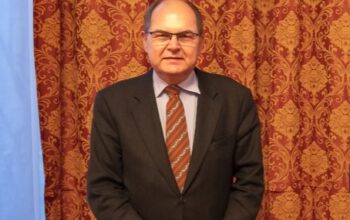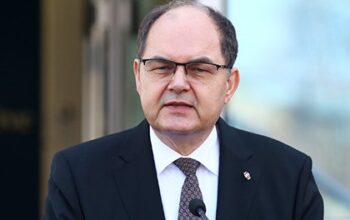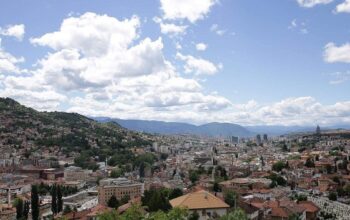This past week, the UN Security Council held its semi-annual discussion of the situation in BiH. The overwhelming sentiment expressed by speakers during the Council session was that the security situation remains calm and stable. Broad support within Bosnia and Herzegovina and in the international community was expressed for a renewed emphasis on economic growth and job creation as well as continued progress toward accession to the European Union. The severe challenge to economic progress resulting from the recent catastrophic flooding was recognized. The good conduct of national elections in October, found to be free and fair by international observers, was noted.
As in past years, Republika Srpska filed its own report with the Security Council detailing the Government’s objectives and noting relevant aspects of the economic and political situation. Excerpts from this report are set out below following selected comments from the speeches of the European Union representative and High Representative, Valentin Inzko.
H.E. Thomas Mayr-Harting:
On 12 October 2014 Bosnia and Herzegovina held Presidential and general elections. We note the good conduct of these elections. Now, it is of utmost importance that the country’s institutions and governments at various levels are established as early as possible and that they can quickly begin their work addressing country’s numerous challenges.
As a matter of particular priority, the leadership of Bosnia and Herzegovina needs to focus on the social and economic agenda. The urgency in this regard was further increased in the aftermath to the devastating floods which struck Bosnia and Herzegovina this year [as well as other countries of the region].
Mr. Valetin Inzko:
Overall, we expect the needs of citizens to be tackled head on and for the country to be put back on track for Euro-Atlantic integration, the declared strategic objective of Bosnia and Herzegovina.
Steps need to be taken urgently by the incoming authorities to overhaul the business environment so that new jobs can be created in the private sector. Let me take this opportunity to say once again that I fully support the EU’s “Compact for Growth” initiative.
Progress on Euro-Atlantic integration has to be unblocked.
*******
12th Report of Republika Srpska to the UN Security Council:
Recovery, growth, and jobs
In May, floods caused by BiH’s heaviest rains in 120 years caused immense damage to RS homes, businesses, farms, and infrastructure. The RS has mobilized every available resource for relief, recovery, and rebuilding while ensuring transparency and accountability for the funds raised and spent. The RS is continuing to implement economic reforms to improve the RS’s environment for business and investment. The RS is also pressing ahead with legal and regulatory reforms necessary for European integration. Moreover, the RS is stepping up its fight against corruption and its vigilance against terrorism.
An early World Bank assessment estimated that flood damage in the RS totaled more than KM 2 billion, exceeding the Entity’s annual budget of KM 1.9 billion.
The RS established a solidarity fund almost immediately after the floods in order to collect, track, and fairly distribute the donations received. The RS also created a solidarity tax. Using these funds, RS authorities, working with community leaders and elected officials at the town and municipality levels, began distributing electronic payment cards to affected citizens just weeks after the floods. The government also began working immediately to secure emergency assistance from other nations and organizations and to solicit donations from RS citizens abroad. In the days immediately following the heavy rains, the RS established an account to receive such donations, and used social media and other novel avenues to provide up-to-date information on flood damage to RS citizens and the international media, and to encourage and collect individual donations. The government has also been careful to ensure transparency and accountability for all funds raised from individual donors, states, and international organizations.
The RS Government has prioritized the reconstruction of schools and housing. Though the number of housing units and school buildings damaged in the floods is daunting, authorities are making every effort to bring citizens home and open schools with minimal delays. For those unable to return home, the solidarity fund disbursements make it possible to find temporary housing.
As the RS rebuilds its infrastructure, it is focusing on making improvements to help mitigate the impact of future natural disasters. In the words of Prime Minister Cvijanović, the RS is “rebuilding better than it used to be.” Houses destroyed by landslides are being rebuilt on more stable foundations, in safer locations. River and canal levies, as well as roads bordering waterways, are being redesigned using the most modern methods available. The Ministry of Agriculture, Forestry, and Water Management is already implementing reconstruction and improvement plans affecting rivers and canals throughout the entity, using funds from the European Investment Bank. A total of 134 such infrastructure projects are underway or are slated to begin in the coming months.
The RS welcomes the new EU Compact on Growth and Jobs
The RS welcomes the EU’s new focus on economic growth in BiH, including the recently-announced Compact for Growth and Jobs. The RS’s new “one-stop shopping” system for business registration, which became operational in December, has already energized formation of new businesses. In the first half of 2014, the number of businesses registered grew as much as 47% compared to the same period in 2013. The EC’s newly released 2014 Progress Report for BiH praises the RS’s “progress on reforms in the area of business registration.” According to the Progress Report, “[t]he implementation of the ambitious business environment reform in Republika Srpska continued in 2013 and early 2014 with the establishment of one-stop-shops for business registration as of December 2013, the reduction of the number of required procedures (from 11 to 5) and of business start-up costs (from € 500-750 to € 200).” The new system, the Progress Report says, “provides for the streamlining of procedures and enables businesses to register within three days, at a cost of one BAM.”
The RS Government has also made significant progress in implementing its anticorruption strategy, having already put in place anticorruption measures far exceeding those at the FBiH and BiH levels. The RS encourages the EU to emphasize entity and local ownership of the reform process as the Compact is implemented, as successful reforms cannot be imposed from the BiH-level down.
The RS continues to revise its law and regulations to support EU programs and EU accession.
The RS has been working steadily to harmonize RS laws and regulations with the EU’s acquis communautaire. The RS has already subjected more than 1,300 laws, bylaws, and general acts to this procedure since 2007. This is vital to European integration because, under the federal structure established by the BiH Constitution, the vast majority of requirements related to harmonization of laws with the acquis must be implemented by the Entities. Just as important, alignment with the acquis upgrades RS laws and regulations, thus promoting economic growth and other goals. According to European Commission (EC) reports, the RS has significantly outpaced the FBiH in achieving reforms required by the SAA and Interim Agreement.
In its 2014 Progress Report for BiH, the EC says that the RS “remains engaged in the approximation of draft legislation with the acquis” and that the RS’s “administrative capacity to monitor EU-related legislation remained good . . . .” The Progress Report further observes: “In the Republika Srpska National Assembly, the EU Integration Committee continued to cooperate closely with the government in assessing the level of compliance of proposed legislation with the acquis.” Meanwhile, “political turbulences” in the Federation “had a negative impact on the adoption of EU-related legislation.” According to the Progress Report, “Legislative offices of different governments in the Federation do not cooperate systemically to harmonise legislation or to approximate it to the acquis.”
Disagreements within the FBiH are blocking progress
Unfortunately, progress toward EU integration at the BiH level has stopped because of the failure of the FBiH’s Bosniak and Croat parties to resolve disputes with each other and obstruction by one of the leading Bosniak political parties.
In October 2013, a solution for the establishment of a coordination mechanism for EU integration was close at hand. The top leaders of BiH, the RS, and the FBiH, with the help of EU, had reached a high level of agreement. The solution was agreed with respect to the RS; the only outstanding issues were matters that need to be decided within the FBiH, with respect to the position and the role of its cantons. Unfortunately, FBiH leaders have been unable to resolve their differences on these matters.
Efforts to implement the European Court of Human Rights’ judgment in Sejdić-Finci v. BiH have followed a similar pattern—the solution is already agreed with respect to the RS but still awaits agreement with respect to the FBiH. In October 2013, the leaders of the seven top parties in BiH, with EU facilitation, agreed that two members of the BiH Presidency will be directly elected from the FBiH and one directly elected from the RS (with no ethnic qualification). Although the agreement resolves the issue with respect to the RS, it leaves open the issue of how each of the FBiH’s two members of the Presidency is to be elected. Unfortunately, the FBiH’s Bosniak and Croat parties have, since then, failed to reach an agreement on this last remaining obstacle to implementing Sejdić-Finci.
The full report can be found here.


